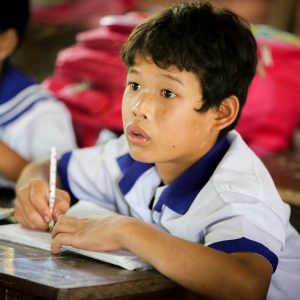For many children in Cambodia, their sixth birthday signifies the exciting day that they get to go to school. But 13-year-old Sobine didn’t start school until the age of 10. Despite a late start to his education, Sobine is determined to finish high school.
“My family was very poor, and I had no idea how I would be able to send Sobine to school. We live in poverty and there was a lot of violence in our home,” said Sobine’s mother, Sophors.
When Sobine and his mother moved in with their stepfather, a construction worker, he was enrolled in the nearest primary school. But he struggled to keep up with reading and writing.
“I couldn’t read very well in the second grade. Since I’m older than my classmates, they could read but I couldn’t, and this stressed me out. I didn’t like myself because I couldn’t achieve as much as the others.”
ChildFund Cambodia’s ‘Easy to Learn’ program makes sure that every child can access a quality education. The program runs activities that give teachers the skills to support children who are falling behind in literacy and numeracy. It also renovates libraries and provides tablets that have a digital library of age-appropriate books.
The goal of the project is to improve the literacy and numeracy skills of primary school children and to develop a peer tutoring program so children can help their peers who may be falling behind.
The project provides school uniforms and other school supplies like bags, books, and pencils to other children in need, so that they can complete a primary school education. As a mother, Sophors is delighted that programs like this have been able to contribute to her son’s education.
“I am really pleased that he has been able to move his study further. Even though I am limited in what I can provide, I want all my children to be literate so they can have rewarding careers in the future. I don’t want them to be as impoverished as I am,” she said.
“I’m so happy that I can read better now. My teachers and classmates gave me a lot of support. They helped me to memorise the alphabet and symbols. I also enjoy using the apps and reading toolkits to help me learn the letters,” said Sobine. “When I grow up, I don’t want to work in a restaurant like my older brother. I want to work in an office building.”
Learn more about how ChildFund Cambodia is working with local communities and partners to make sure that children living with hearing impairment and other disabilities can access an education and have a chance at a brighter future.
In the small village of Puno, Timor-Leste, children spent hours walking to a nearby stream to collect clean water.
They had to walk with buckets, on a long and dangerous journey for children travelling alone. Instead of playing or studying, they spend hours collecting water.
“The children spend two hours to get water and carry it back using the wooden cart. They get water twice a day. The distance from our place to the water take 500 metres. It can be very risky but as parents and big sisters we all must look after them. We make sure they are safe and always hold their hand,” said Carolina, one mother in the community.
Carolina is a mother to eight children and teaches at the local kindergarten. Carolina knows how important it is to have easy access to clean water. “Water is very important in our community. We need it for drinking and cooking. And it is hard when we can’t access it easily.”
Easier access to water means that Carolina and her family can cook healthy food, shower, wash their clothes, and give water to their farm animals. “If the kids have school in the morning, then they must get the water in the afternoon so that they can use for showering the next morning before school. If there is no water, then they must go to school without taking a shower.”
With support from ChildFund Timor-Leste, the community installed a new water system that is more reliable and closer to the village. The water system serves 34 homes – approximately 200 people.
“Now the water is accessible any time but now our concern is that we don’t have a tap-stop to divide the water. We only use a hose directly from the pipe and because the water was installed in an old room next to the toilet, sometimes we need to take the hose out from the toilet to the outside to prepare meals for children or to be used for kitchen needs.”
The village Chief of more than 17 years, Filipe, explained that the whole community helped in the construction of the water system. “We had a lot of people helping. I divided them into two groups of about 50 people. They helped with the construction and prepared food for the volunteers.”
The water protection project provides communities with access to clean water for agriculture, schools, and the health post in Puno.
Learn more about how ChildFund works with local partners and communities in Timor-Leste to improve water access.
The Disaster READY (DRR) project is funded by the Australian Government through the Australian Humanitarian Partnership (AHP). The water rehabilitation project was one activity that was part of the Disaster Risk Reduction Community Action Plan. The initiative was led by the community.


